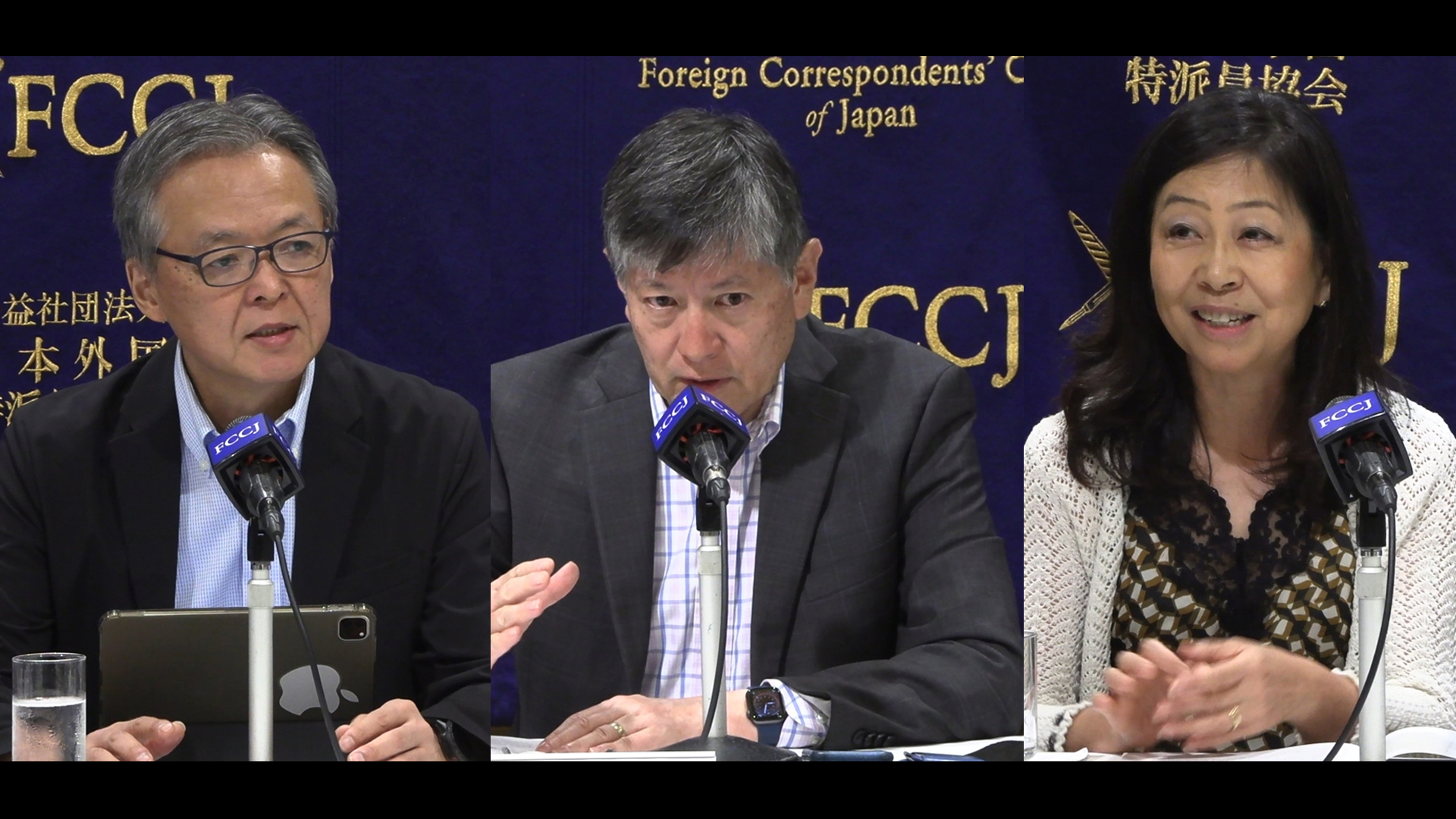Issue:
August 2023 | Deep Dive
Japan and other ‘middle powers’ need to refashion their security strategy, experts tell FCCJ Deep Dive event

Should Japan stop acting as a junior partner in a polarizing alliance of U.S.-led powers and instead form its own family of “middle powers” that act in their own mutual interest? This was the question posed during a recent Deep Dive event at the FCCJ.
A trio of senior academics argued that as competition and confrontation between the U.S. and China intensifies, and as the future of the international order in Asia becomes increasingly uncertain, Japan needs to refashion its diplomatic and security strategy.
The three were: Mike Mochizuki, associate professor of political science and international affairs at George Washington University; Yoshihide Soeya, emeritus professor in the faculty of law at Keio University; and Kuniko Ashizawa, adjunct professorial lecturer at the American University in Washington.
The report they unveiled at the club on July 25 – Asia's Future at a Crossroads – has been five years in the making by 11 prominent scholars and former Japanese practitioners of foreign policy and international relations, with the support of former Japanese Prime Minister Yukio Hatoyama.
Its recommendations include policies that “differ from current government policy,” Hatoyama (prime minister from 2009 and now president of the East Asian Community Institute ) acknowledged in an introduction. These are needed for Japan to become a “truly independent, peace-loving nation,” he added.
The “tendency to cooperate with nations that share the same values [and to] view those with different values as enemies has become more pronounced”, said Hatoyama, who was Japan's first prime minister to belong to the then Democratic Party of Japan. “What lies ahead is inevitably intensifying conflict.”
Introducing the report at the Deep Dive, Mochizuki said that at the end of 2022, the government adopted a new National Security Strategy for the first time in a decade. “What stands out is the strong emphasis on power politics (including military capabilities) as well as economic security,” he said.
The new strategy stresses the centrality of Japan’s self-defense capabilities and of the U.S.-Japan alliance [yet] there exists a significant disparity between the paradigm presented in the new National Security Strategy and Japan’s own [military] capabilities. The U.S.-Japan alliance is deemed essential to fill this gap, Mochizuki added.
Strengthening the alliance is the strategy's basic premise and prescription. But while this is logically consistent, the authors of the report emphasised that “our serious concern that the new paradigm will leave Asia entangled and divided in the future”.
The report went on: “Japan’s long-held emphasis on a multifaceted and multilayered approach to Asia policy continues to be a constructive way to address new regional and international challenges. Yet recent foreign policy discourse has tended to focus more on great power competition than on interstate cooperation.”
Japan, the Deep Dive panelists argued, should maintain and promote security cooperation with the U.S. but at the same time “exercise leadership to help mitigate competition between the U.S. and China in Asia through constructive diplomacy, thereby reducing the danger of great power war in the region”.
Without this, they added, “there can be no solution to transnational problems and no progress toward a world free of nuclear weapons. Such efforts are consistent with the concept of middle-power diplomacy, aimed at a more autonomous foreign policy close to but not solely dependent on the U.S.”.
Relations with the United States remain an important pillar of Japan's foreign policy. However, in using the rationale of strengthening the U.S.-Japan alliance, Japan should not neglect countries that are not allies or partners of the United States, they said.
To mitigate great power competition and prevent it from escalating into great power wars, Japan should “deepen cooperative relationships with middle powers in the Asian region, such as South Korea, Australia, New Zealand, India, and the Association of Southeast Asian Nations (ASEAN) and become a driving force of middle-power cooperation”, the report said.
“While defending fundamental human rights and democratic principles, Japan should recognise the diversity of political systems in Asia and be sensitive to the different historical trajectory and sociocultural traditions in each country."
Tokyo should resist moves to divide Asia into a struggle between democracies and autocracies and avoid an overly ideological approach to foreign policy. It should also be cautious about defining the Asian region solely in terms of the Indo-Pacific – a concept that has recently been used frequently in international political discourse.
While the concept of the Indo-Pacific has the advantage of emphasizing the importance of freedom of navigation and the security of long sea lanes vital to international trade, it has the drawback of viewing the Asian region primarily in maritime terms.
The concept “diminishes the importance of continental Asia and suggests an intention to counter or contain China,” the report said. “Rather than concentrating on a single geographical concept, Japan’s diplomacy should reflect a multifaceted view that also incorporates the perspectives of the Asia Pacific, East Asia and Eurasia.”
The Deep Dive event was the latest in a series in which panels of experts are invited to discuss topics of current interest in more depth and detail than at regular press conferences.
Anthony Rowley is a columnist and contributor for the South China Morning Post.

